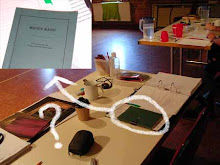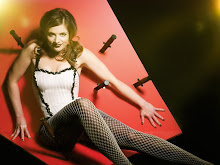
This post is a continuation from yesterday's about the Time To Talk on Tuesday night. So, if you've not read yesterday's post yet, it appears directly below this one.
Peter Clarke began the discussion by getting all of the creatives to speak about their contributions. Then he opened the forum to the audience to ask whatever questions they were interested in getting answers to.
This is an approximation of how the discussion unfolded after this point. This is mostly paraphrased; even things that are in quotations are not direct quotes.
“What from the research informed the script the most?”
Chris and Lally fielded this one; they mentioned three things. The stories told to them by Frank Van Stratten; writer, broadcaster and theatre historian. The figure of Hugh D. Mackintosh, entertainment entrepreneur of the era. A video that Chris and Lally watched in which old vaudeville entertainers talked about why vaudeville died. All the old performers had different thoughts for why it had 'died', but ultimately the sense that the pair got from watching the film was that all of these performers found it impossible to move on.
Chris then went on to talk about nostalgia, and that the deeper he researched the vaudeville world, the more he realised that many of the acts just wouldn't be well received today. He came to the understanding that it is far better that piano players in black face, comedians doing racist jokes and the like, are better off left behind. Nostalgia can give these acts a sheen of romantic allure, but this is likely at the expense of seeing these acts for what they really were, and at the expense of allowing artists to move on.
“You've set the play in 1914. Would you have a ventriloquist as raunchy as that in 1914?”
Good question. The answer to this question came from a few different people. It's an interesting and complex question. The first answer was that perhaps you wouldn't find an act as raunchy as this in 1914. However, in the context of the piece, this show is not a typical 1914 vaudeville show. In fact, it is a dismal failure. Their acts are actually turning people away. Secondly, we don't really know how raunchy the acts of that time may have been. We do know that some of these acts were very bawdy, and quite flagrant in providing their audiences with titillation. Certainly there's no shortage of racy puns and inuendo in Shakepeare, which was three centuries prior. It might be a misunderstanding to presume that standards in today's theatres are
more liberal than in the past. Having said that, Chris concedes there may be some anachronism in some of the phrases the characters use. The balance is in what serves the work as a piece of theatre for today's audiences, and what is historically correct. After all, it is an artwork first, not an historical document.
The follow up question to this one is; “Are the actors playing to an imagined audience in 1914 or the Beckett Theatre?”
Another interesting question. The cast field this question between them. The actors seemed to have differing views on this. Some discuss that they imagine that they play to a 1914 audience, others that they don't think about the audience because there is not supposed to be one in the first act, still others say that it is impossible to play to anybody BUT the audience that is in the theatre at the time; anything else might sound clever, but it is actually not possible to play.
“How much input did the actors have into the construction of the show?”
Lally says that on this piece she and Chris were determined they would have a 'finished' script that wouldn't change much over the rehearsal period. However, as regular readers of the blog will know, the script was still being worked on right through the rehearsal period and cuts were being made through the preview period. Chris says that while the cast had no specific role in developing the script, their instincts for what was working and what was not was invaluable to the process.
Finally, Peter asked Chris and Lally for any final comments or reflections they had. Lally reflected that she's really happy for the show to be in the hands of the actors now. She was so frantic in the lead-up, that it's real relief that the cast now owns the show. Chris said that he has just begun to watch the show as a spectator rather than a director, but it will not be until next week that he could really enjoy the show.
The forum was well attended, and was a relatively long one; a reflection of how interesting the show is, and also a reflection of the fascination that comes with experiencing how Chris has managed to successfully weave so many extraordinary elements and layers into the piece.
Once again, our thanks to Peter Clarke. If YOU have any questions for any of the team don't hesitate to send them in and I'll see if I can get an answer for you!






